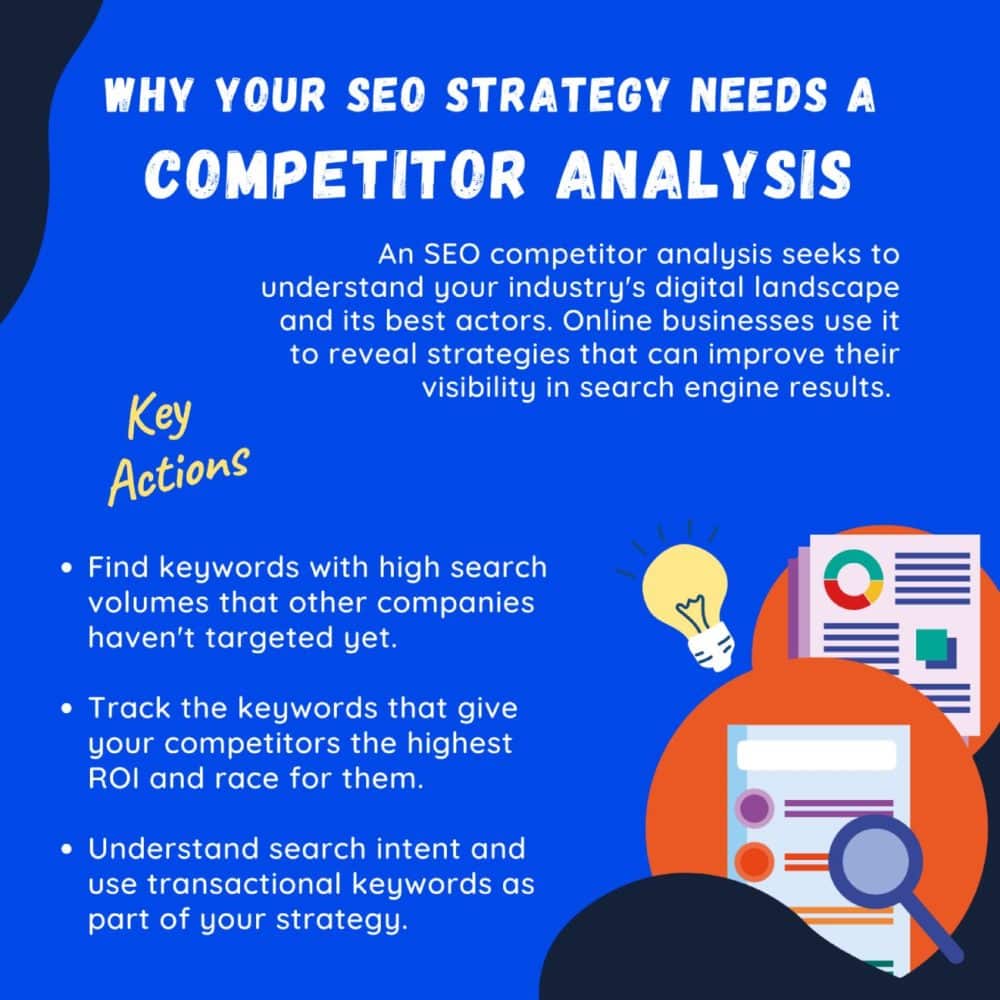Why Your SEO Strategy Needs a Competitor Analysis
There is no doubt about it: the SEO competitive analysis seeks to understand your industry’s digital landscape and all of its best-performing actors. In fact, SEO experts widely employ this type of research to uncover the best strategies to improve a website’s ranking and make it stand out from the “online crowd.” Although the SEO competitive analysis is also referred to as competitive keyword analysis, it entails much more than merely assembling a list of keywords.
But why is knowing your online competition that important? Well, a good look at the eCommerce business environment will clarify that question. In the past decades, the internet as an online marketplace has turned into a winner-takes-all environment. For example, according to Ahrefs, the top 3 Google search results get more than 75% of all clicks. And this high-volume organic traffic translates to valuable leads and online customers in eCommerce. In short, the stakes are high, and the winning (Google) spots are scarce and almost impossible to reach without a master plan covering content SEO, digital marketing, and content creation. If you have launched your business website for a while but haven’t noticed a steady growth in website visitors, you might have forgotten to complete one of the most crucial marketing tasks out there: the SEO competitive analysis!
DEFINING: THE COMPETITIVE ANALYSIS
As an invaluable marketing and business management tool, the competitive analysis lets you assess and use the strengths and vulnerabilities of businesses that sell similar products and target the same market segment. The base idea is that knowing your competition allows you to create and enhance your very own eCommerce strategy.
Still, despite its invaluable potential, most online companies do not perform this type of analysis thoroughly or, worse yet, at all.
DOES EVERY E-COMMERCE BUSINESSES NEED ONE?
The short answer is yes; every online business interested in selling products should perform a competitive analysis. But what makes this method essential to a company’s digital strategy regardless of its industry or state of development?
On top of gathering valuable data on strong players in your industry, a competitive analysis generates actionable steps for creating a successful long-term marketing plan. It also helps businesses reevaluate underperforming plans to derive better results and set realistic KPIs.
HOW IS THE COMPETITIVE ANALYSIS RELEVANT TO SEO?
A business’s SEO strategy and competitive analysis are intrinsically connected. After all, the whole point of search engine optimization (particularly for eCommerce purposes) is to help websites rank better in search engine results. Of course, this often translates to “ranking higher than the competition.” This ensures that when potential clients Google something related to your products and services, they see your website among the very first results, click on it, and hopefully make a purchase.
Thus, a competitive analysis learns from top-ranking websites in your industry and looks for possible gaps that your business can then use to get ahead. In layman’s terms, by understanding your industry’s competitive landscape, you can reveal the best strategies to boost your spot in the Search Engine Result Pages (or SERPs for short). It’s a way of reverse engineering someone else’s path to success and gaining actionable insights into how to trace your own!
DEFINING: COMPETITIVE KEYWORD ANALYSIS
The competitive keyword analysis is one of the main components of an SEO competitive analysis, but definitely not its only one! Also known as a keyword gap analysis, it refers to the process of discovering valuable keywords that your audience uses and your competitors rank for.
If you’re not sure what keywords are and how they affect your website performance, check out this blog by Dine.Agency. According to SEO expert Neil Patel, a great competitive keyword analysis should include:
- Find keywords with high search volumes that other companies haven’t targeted yet.
- Track the keywords that give your competitors the highest ROI (return on investment) and race for them.
- Know the search intent behind keywords you target, and make sure to use transactional keywords in your strategy. These are terms used by customers interested in purchases (e.g., “buy winter shoes online”).
THE BEST SEO COMPETITIVE ANALYSIS TOOLS
Many powerful tools leverage what we usually call artificial, automated, or algorithmic intelligence to maximize the efficiency and accuracy of any SEO competitive analysis. Naturally, many such complex tools include other functions crucial to your website’s SEO strategy, making them very expensive, too!
To cut to the chase, some of the most popular SEO competitive analysis tools are:
- SEMrush
- Ahrefs
- Backlinko
- Google Search Console
- Ubersuggest
- Keyword Surfer
- Answer the Public
- SimilarWeb
Now, purchasing the best industry tools created and used by the world’s top SEO experts isn’t nearly enough to produce a competitive analysis. These tools must be properly operated and calibrated to meet your business needs! In a nutshell, you’ll still need an SEO specialist to generate, implement, and adjust your SEO competitive strategy.
TO SUM THINGS UP

So what can we gather from all of this? Over time, using a competitive analysis as part of your SEO strategy can boost your Google ranking, leading more clients to your website or eCommerce platform.
However, there are many, many other components (like on-page, off-page, and technical SEO) that you must handle as part of your website’s search health. Additionally, both the tools and the in-house experts are expensive to acquire. The great news is that hiring a professional digital agency can significantly cut these costs and generate the ROI you haven’t yet drawn from your eCommerce efforts. If you need a digital expert to help you learn about your digital competitors and build a growth-oriented strategy, then be sure to contact us today!












